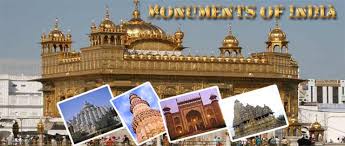Essay on The Historical Monuments of India
 Essay on The Historical Monuments of India
Essay on The Historical Monuments of IndiaIndian History is fall of rise of many kingdoms. Monuments, built by different kings, throw light on the past history of India. Taj Mahal, built by Shah Jahan is one of the seven wonders of the world. Fed fort is famous for the use of red stone and marble.
Construction of Qutab Minar was begun by Qutub-u-din-Aibek and completed by Iltutmish. It is viewed as a symbol of military might of Turko-Afghan dynasty. Hyderabad is often identified with `Charminar`. Some of the religious monuments are `Jagannath Temple` Konark Sun Temple, Badrinath Temple, Jama Masid of Delhi, Golden Temple of Amritsar etc. Some great buildings have also built in India by the Britisher. They are Parliament House, Rashtrapati Bhawan, Civrorai Memorial etc. All these monuments tell the tale of past but will shine forever.
Indian History is full of the rise and fall or many kingdoms and empires. Monuments, built by the kings and the emperors of every period, throw light on the past history of India. These monuments exhibit the glory of Indian and are part of our cultural heritage. Almost all states of India boast of some or the other important historical monuments. Thousands of tourists visit India to have a glimpse of its important historical places.
Taj Mahal is one of the most famous and beautiful bu8ilding of the World. Taj Mahal was built by Emperor Shah Jahan as a tomb of his wife Mumtaz Mahal. It`s matchless beauty draws visitors from all parts of the world. The Taj Mahal got the highest ranking among the seven wonders of the world after the biggest online poll at new7wonders.com. Apart from Taj Mahal, there are other historical monuments in Agra. Agra fort, Buland Darwaza, Tomb of Itmand-ud-daula are some significant among them.
Red Fort (Lal Qila) is one of those monuments which enhance the grace of Delhi. Red Fort was also built by Shah Jahan, the Mughal emperor. The architecture of this building has a splendid impact of red stone and marble works. It has delicate carving on every possible surface.
Qutub Minar is also a significant historical monument. The construction of Qutub Minar was stared by Qutub-ud-din-Aibek in 12th century. But it was completed by his successor Iltutmish. The minar rises over 230 feet. The walls of the minar intricately carved and inscribed with verses from the holy Quran. It is often viewed as a symbol of the military might of the Turko-Afghan dynasty. Delhi also boats of historical mounuments like- Purana Qila, Humayun`s tombh, Jantar Mantar and many more.
Hyderabad is famous for its charming minarets Charminar. The city if often identified with the majestic Charminar which stands at the centre of old city. It was build by Muhammad Quli Qutub Saah. Charminar, with its enormous size and majestic splendor attracts a number of visitors. Hyderabad has many other famous monuments like Golkunda Fort, Purani Haveli, Tombs of Qutub Sahi kings etc.
There are a number of such monuments that are only historically famous but also have a religious significance. Puri is well known for a 12th century temple called `Jagannath` erected in honor of Hindu god Vishnu. It was begun by king Chodagangadeva and completed by king Ananga Mhima Deva III, It is a very vast temple-awesome and stunning in its structure.
Konark Sun Temple is also a paragon of Oriyan art and architecture. The temple was built by the Ganga dynasty ruler, Narsimha Dev I in 13th century. It took 12 years to complete this temple. Although parley in runes, its colossal size, intricate stone art work and diversity of themes expressed, simply take one`s breath away. Rabindra Nath Tagore described it as `poetry in stone`.
Jama Masjid is the largest mosque in India. Sash Jahan built it in 17th century in Delhi. It is also known as Masjid-e-Jahan Numa. Its courtyard has the capacity to hold nearly 250,000 worshippers. use of white marble, wide stair cases and arched gateways are the hallmark of this popular mosque.
Golden Temple of Amristar is also known as Harmandar Sahib or Darbar Sahib. It is a great pilgrimage centre of the Sikhs. The holy temple was completed under the direct control and supervision of Guru Arjan Dev. It`s foundation stone was alid by a renowed Muslim divine, Mian Mir. The Guru intended to keep the temple open to people of all castes, creeds and faiths. So, it was given four doors, one in each direction. It has a large pool around it. During Maharaja Ranjit Singh`s reign, the lower half of the temple was decorated with marble, hwile the entire upper half was inlaid with copper voered over by gold plate. Hence it is known as Golden Temple. Some other religious monuments are Badrinath Temple, Dilware Temple, Dakshineshwara Temple, Kailashnath Tempe, Seven Pagodas, Lingaraja Temple, Kashi Vishwanth Temple, Durga Temple, Vithalaswami Temple, Hazara Temple, Lotus Temple, Rameshwaram Temple etc.
In British era too some important monuments were constructed. These monuments have their own important place in India History. India Gate was constructed in the memory of those Indian soldiers, who were killed in World War I. Gateway of India was built to commemorate the visit of the first ever British Monarch, king George V and Queen Mary in 1911. There are a number of other monuments built by Britisher. These are Rashtrapati Bhawan, Parliament House, Victoria Memorial etc.
All these monuments are visited by millions of tourists, across the globe, thought out the year. These are significant parts of India`s rich cultural heritage. These monuments tell the tale of past but will shine forever.
